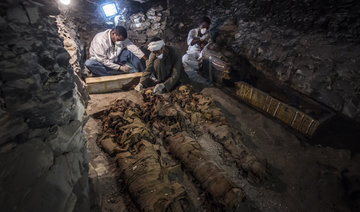CAIRO: Egypt’s presidential election campaign began on Saturday. The election, in which President Abdel Fattah El-Sisi is running against Mousa Mustafa Mousa, head of opposition party Al-Ghad, will take place on March 16, 17 and 18 for expatriate Egyptians in 124 countries and in Egypt on March 26, 27 and 28.
Mohammed Bahaa Abu Shoka, spokesman for the El-Sisi campaign, said that many political parties and campaigns have been established to support El-Sisi and that the majority of members of parliament have already joined the president’s “Support Egypt” campaign.
He claimed that the “Free Egyptians,” “Protectors of the Homeland,” “The Conference,” and the “Republican People” parties had joined the campaign in addition to pro-El-Sisi groups “The Citizen” and “For Egypt.”
“The campaign is open to the participation of other entities and people,” he added.
“The El-Sisi campaign aims to raise awareness among the Egyptian people in the face of calls to boycott the elections,” he explained, adding that the president’s platform included “achieving Egypt’s best interests, completing construction projects and creating a strong state capable of coping with challenges.”
No party has yet declared its support for Mousa.
“I am a candidate who is not supported by any party, person or entity, because everyone thinks that by standing by me, he stands in the face of El-Sisi,” Mousa said. “Time will not allow me to tour all provinces, but I will work on delivering my program to all people.”
Moussa has appeared as a guest on a number of television programs and has confirmed that if he wins the presidency, he will choose former Prime Minister Ibrahim Mahlab as head of his government. He has also indicated that the majority of the current government will keep their posts.
The head of Egypt’s famers syndicate, Hussein Abu Sadam, recently withdrew support for Mousa’s campaign.
Mousa is something of an unknown quantity in Egypt. Ahmed Al-Jundi, a government employee, said he had never heard Mousa’s name before, and had barely heard anything of the Al-Ghad “for more than five years.”
The election comes at a time of economic uncertainty for Egypt. The majority of Egyptians will likely be swayed by campaign promises of higher wages, inflation control, greater job opportunities, and affordable housing.
Unemployed university graduate Mohammad Moataz said he supports all those demands, explaining that he will vote for the candidate who can meet them immediately, regardless of whether that is El-Sisi or not.
Hadeer Ahmed, another student, agreed and added that security and the war on terror should also be given priority.
A low voter turnout is expected, given the widespread belief that El-Sisi will be re-elected by a huge majority.
In her meeting with members of the Egyptian community in Kuwait last week, Minister of Immigration and Egyptian Expatriates’ Affairs Nabila Makram warned that a lack of voter participation would achieve the “goals of the enemies of Egypt,” adding that Egyptians abroad should set an example for domestic voters.
Faiza Mahmoud, a housewife in Cairo, says she is keen to participate because she believes that “many of the rights that were taken from women in the past have returned in recent times.”
Karam Jabr, president of the National Press Association, stressed that the media needed a “commitment to neutrality and equal coverage between candidates,” and that journalists and publishers should abide by the standards set by the National Electoral Commission.
Journalists from across the globe are expected to cover the election, which is just the fourth multi-candidate presidential election in Egypt’s history.
“Every voter has the right to vote and must not give up his right,” Jabr added. “Elections under judicial supervision guarantee the highest degree of integrity and there is no justification for the voter not going to the election committees.”
Egypt’s presidential election campaign begins
Egypt’s presidential election campaign begins














